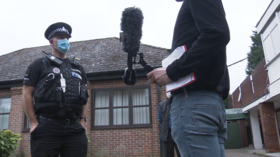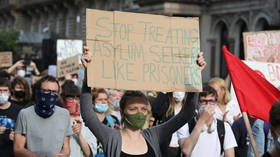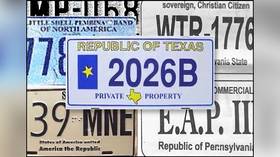Police stop RT interview with asylum seeker as we investigate the controversy of migrants living in hotels all around the UK

Hundreds of illegal migrants arriving daily on small boats and dinghies are being housed in 3- and 4-star hotels across the country, causing consternation among local residents. Why are officials being so silent over this?
As a journalist in Britain, you don’t expect to be shut down by the police. But that’s precisely what happened during RT's visit to the 3-star Bell Hotel in Epping, about 17 miles north of London. No blame can be attributed to the officers, who were only responding to a call from the hotel’s management.
The question is, why were they even alerted?
The reason for that is unclear, but it’s just one of a number of unanswered questions about the controversy surrounding hundreds of asylum seekers being housed in hotels up and down the country, some operated by well-known chains like Hilton, Holiday Inn and Radisson.
Social media has been ablaze with a list of around 20 establishments being circulated by activists, highlighting where the asylum seekers are staying.
Some people are privately concerned that rogue elements may begin to turn up at these hotels to confront the migrants, which in the worst circumstances could possibly spark violence.
Nigel Farage, the Brexit Party leader, posted a video of him visiting a Hilton hotel in Bromsgrove, Worcestershire but despite a big reaction, the mainstream media has generally avoided the matter.
On our visit to The Bell Hotel, we were unsure what to expect.
Some hotels reportedly have security guards, but when we arrived, there was no answer at the entrance and the front door was locked. However, many of the rooms are in small buildings surrounding the reception, so we walked over and spoke to three asylum seekers.
The first was from Kuwait, who spoke very little English, however he managed to confirm he had arrived by boat.
The second noticed us from his bedroom window and informed us that he had come from Sri Lanka, with his wife and child.
The third was a charming young Kurdish man - also with his wife and kids - who had previously worked as an interpreter back home and was keen to find employment in England.
He began to speak at length, detailing his motivations and why he wanted to build a new life to offer hope for his children.
The government’s position? Silence
But despite no one appearing to be unhappy, the interview was cut short as the police arrived – in total, four officers in two cars, one of which was unmarked.
They informed us the management has said we were trespassing on private property and the officers politely escorted us off the premises - and also informed us where we could continue filming.
We subsequently interviewed three concerned local residents who voiced frustrations about the lack of communication from the authorities about the housing of asylum seekers.
The entire process is shrouded in mystery and misinformation.
The issue has also become more prominent due to the flood of asylum seekers arriving in Britain, mainly by small boats or dinghies from France (some apparently escorted across by French Naval ships), along the Kent coast, mainly into the port of Dover. Thursday alone saw 235 people – including a heavily pregnant woman – cross from France, the highest amount ever in a single day.
That brought the total number of arrivals so far in 2020 to 3,948 – more than double the amount for the whole of last year.
There are also videos of migrants being loaded onto waiting coaches and bussed to various parts of the UK.
Due to Covid-19 restrictions, a decision was made to house them in hotels – which have been closed to ordinary guests. This process is being managed on behalf of the Home Office by three private companies; Serco, Mears Group and Clearsprings Ready Homes.
Each firm controls different regions of the UK, with the cost amounting to £4 billion over 10-years.
RT contacted Serco and Clearsprings – The Bell Hotel is under their jurisdiction – for comment but they advised us to contact the Home Office, who have yet to supply a response to our questions.
We also got in touch with the MP for Epping, Dame Eleanor Laing but her office referred us to Epping Forest District Council, who have not responded.
If the media’s questions aren’t being answered, then is it any wonder members of the public feel ignored?
There are worries about the authorities not knowing who these asylum seekers are, with some online videos showing them discarding their identity cards into the sea before reaching land.
There are claims that some are actually illegal economic migrants, rather than genuine asylum seekers.
‘If you complain, you’re called a Nazi’
In all of this, there’s a large group of local residents who feel they no longer have a voice. RT spoke to several of them, but most were unwilling to go on the record, for fear of losing their employment or being targeted.
One woman, whose husband served in the British Army’s Royal Engineers regiment, told me:
“There's a silent majority in this country who are seething. As soon as you call out mass immigration and kick up about it, you’re called a racist or a Nazi but we aren't - it’s a way of shutting us down.
“No one has a problem with genuine refugees who are running away from raping, pillaging and ISIS, but what we have got a problem with is, our people being on a waiting list for social housing, and these refugees going straight into fully-furnished homes. It's all being done without people’s consent.
“And if you say anything on social media, the police investigate you for a hate crime and it makes you absolutely sick.
“I know a guy who told me he said something on Twitter and the next thing, it was in the local paper and the police were investigating him. He was scared to lose his job and then not be able to afford his mortgage.
"Ordinary people are being persecuted. We feel we don’t have a voice, but we pay our taxes and it's out of control. I don’t blame those people, I blame our government for not stopping it. Why aren't they sending these people back? We feel let down and like we’ve been slapped in the face by our own country.”
Some residents living near a number of the hotels claim to have seen a rise in petty crime since the migrants arrived. Others say it’s only young men who are arriving - but RT’s experience in Epping was contrary to this, with several women and children on site.
There’s also growing concern for the welfare of the migrants, who are legally not allowed to work and because their food is provided by hotels, they do not get the normal £35 stipend.
Back in June, the case of Badreddin Abdalla Adam highlighted this when the 28-year old Sudanese man went on a frenzied knife attack, stabbing six people, before armed police shot him dead. It transpired his room in Glasgow’s Park Inn had a single window, which faced a brick wall.
So after weeks in what was described as a “prison-like environment" and a lack of correspondence about his case, eventually he snapped.
The Home Office contracts state that the three companies have a duty to consider “the dignity, well-being and support” of the asylum seekers. But the tragic episode in Glasgow suggests differently, along with numerous reports of bad conditions being endured.
RT’s visit to Epping also raised questions, as the people seemed to be left to their own devices, with none being clear when their cases would be heard and with no evidence of on-site support.
There appeared to be an air of being stuffed into a hotel and forgotten about.
The Kurdish family of five, including three young children, are all staying together in one room.
More has to be done to ensure these people are being looked after.
If the authorities were open and explained what is happening at the ports, about why buses are there waiting for asylum seekers before they arrive - they could also defuse a lot of the tension amongst the general public.
This type of opening up of things could also help the asylum seekers assimilate into society, if they are granted the right to stay.
What certainly shouldn’t be happening is for the police to have to respond to calls that prevent the media from finding out what’s happening on the streets of Britain.















